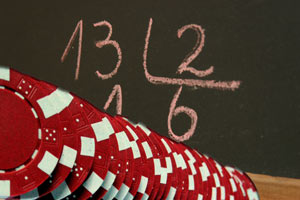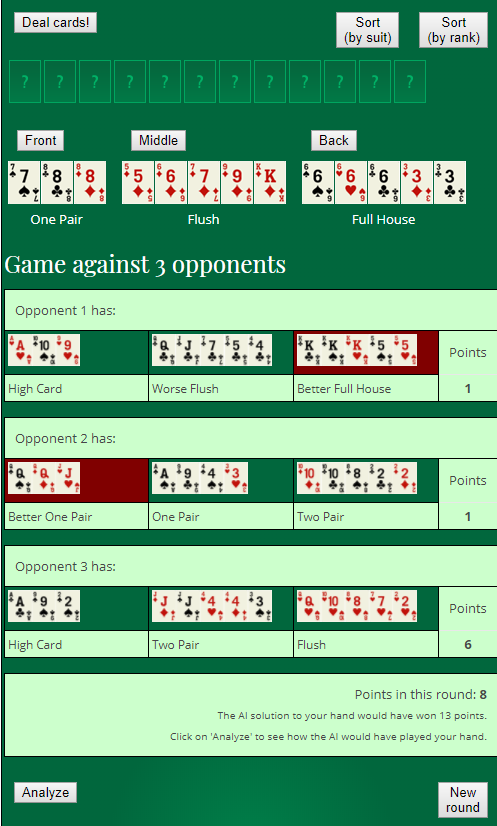Icm Tournament Poker
- What does ICM in poker tournaments mean? ICM or “Independent Chip Model” is a term which will inevitably cross your way if you’re a poker tournament player. In this article we want to explain in detail what ICM means in poker and what this model is used for. What is a chip worth in a poker tournament?
- ICM is a widely used mathematical model that is used to determine your equity in a tournament based on your current chip amount and the payout structure of that tournament. This typically results in more.
- Icm Poker Charts
- Icm Tournament Poker Tournaments
- Icm Poker Theory
- Icm Tournament Poker Tournament
- Icm Poker Strategy
In poker, the Independent Chip Model (ICM) is a mathematical model used to calculate a player's overall equity in a tournament. The model uses stack sizes alone to determine how often a player will finish in each position (1st, 2nd, etc.). A player's probability of finishing in each position is then multiplied by the prize amount for that position and those numbers are added together to determine the player's overall equity.[1][2]
The term ICM is often misunderstood to mean a simulator that helps a player make decisions in a tournament. Such simulators often make use of the Independent Chip Model but are not strictly speaking ICM calculators. A true ICM calculator will have the chip counts of all players, as well as the payout structure of the tournament, as input and each player's equity as output.[3]
The ICM can be applied to answer specific questions, such as:[4][5]
ICM in the Early Phase of a Poker Tournament or Sit and Go Still using the traditional 9 man SnG as an example, each player starts with 1500 chips, and if they are all equally good, then they each have an. In poker, ICM stands for 'Independent Chip Model'. It helps a poker player at any stage of a poker tournament determine their current tournament equity. (How much money in the prize pool should currently be theirs.). An 'ICM Deal' is the most complex to calculate but also the most fair deal-type players can make in a poker tournament. The ICM Chop takes into account all the possible scenarios and re-distribute.
- The range of hands that a player can move all in with, considering the action so far and the stack sizes of the other players still in the hand
- The range of hands that a player can call another player's all in with, and recommends either calling or moving all in over the top, considering all the stacks still in the hand
- When discussing a deal, how much money each player should get
References[edit]
- ^Fast, Erik (2012-03-20). 'Poker Strategy -- Introduction To Independent Chip Model With Yevgeniy Timoshenko and David Sands'. cardplayer.com. Retrieved 12 September 2019.
- ^'ICM Poker Introduction: What Is The Independent Chip Model?'. Upswing Poker. Retrieved 12 September 2019.
- ^Walker, Greg. 'What Is The Independent Chip Model?'. thepokerbank.com. Retrieved 12 September 2019.
- ^Selbrede, Steve (2019-08-27). 'Weighing Different Deal-Making Methods at a Final Table'. PokerNews. Retrieved 12 September 2019.
- ^Card Player News Team (2014-12-28). 'Explain Poker Like I'm Five: Independent Chip Model (ICM)'. cardplayer.com. Retrieved 12 September 2019.
Further reading[edit]
- Harrington, Dan; Robertie, Bill (2014). Harrington On Modern Tournament Poker. Two Plus Two Publishing LLC. ISBN1-880685-56-6. Harrington discusses the ICM on pages 108-122.
- Collin Moshman (July 2007). Sit 'n Go Strategy: Expert Advice for Beating One-Table Poker Tournaments. Two Plus Two Publishing LLC. pp. 122–. ISBN978-1-880685-39-6.
- Jonathan Grotenstein; Storms Reback (15 January 2013). Ship It Holla Ballas!: How a Bunch of 19-Year-Old College Dropouts Used the Internet to Become Poker's Loudest, Craziest, and Richest Crew. St. Martin's Press. pp. 17–. ISBN978-1-250-00665-3.
What is ICM? > How to use ICM
Easy-to-understand guides for the independent chip model (ICM) in poker are few and far between, so I'm going to try hard to keep this article as concise and relevant to improving your Sit and Go tournament game as possible.
In this article I aim to answer the question 'what is the independent chip model?' and also highlight how you can go about working it out.
In the next article, I will explain how ICM can be used in tournament poker to help you make profitable decisions near the bubble. Let's get started...
What is the independent chip model?
The independent chip model assigns $ value to your chip stack in a tournament.
How much are 100 chips worth in a tournament? How about 10,000 chips? Well that all depends on a few things:
- The amount of chips in play.
- The prize pool distribution.
The amount of chips in play.
If there are only 1,000 chips in play, then those 100 chips are quite valuable. However, if there are 100,000 chips in play, then 100 chips isn't really going to be worth all that much at all.
The prize structure.
Lets say you have 100 chips (out of 1,000 left at the table), there are 5 players left and only 1st place pays. The $ value of those 100 chips is not really a lot, as your chances of walking away from the tournament with some money in your pocket is quite slim.
However, if there are 5 players left and there is an equal payout for 1st, 2nd, 3rd and 4th, the chance of you winning some money is not so bad, so your chips are worth a little more in terms of $ overall.
Think about it, would you rather take a player's 100 chips when only 1st place pays or if 4 places pay equally (with 5 players left at the table)? You're going to see a better ROI in the long run by taking the player's chips when 4 places pay as opposed to 1.
In the following section I will use the ICM idea of each chip being worth something in terms of $ for working out our overall prize pool equity based on the size of our chip stack.
Using ICM to work out prize pool equity.
If you have 5,000 chips and player B and C each have 2,500 chips, how much is your 5,000 going to win for you in the long run?
Icm Poker Charts
In a tournament it's not like we can cash out our chips at any time for what we think they're worth. We have to continue playing to see whether we take down 1st, 2nd or 3rd prize in the tournament. Of course, the more chips we have compared to the other players the more likely it is we will win one of the top prizes.
To put it another way, using the ICM we work out our prize pool equity, which is the amount of money we expect to win from the tournament on average based on:
- The current size of our stack.
- The current size of the other players' stacks.
- The amount of money in the prize pool and how much you get for coming 1st, 2nd, 3rd and so on (prize pool distribution).
Icm Tournament Poker Tournaments
Basic prize pool equity example.
At the very beginning of a $20 tournament before any cards are dealt, each player has the same stack size and therefore will have the exact same equity of $20 in the tournament. Easy enough. To give another similar example...
There are 4 players left at the table in a $10+$1 SnG at PokerStars. The total prize pool is $100 with a standard 1st, 2nd and 3rd payout of $50, $30 and $20 (but that's kinda irrelevant for this example). If all the players have an equal amount of chips, their prize pool equity would be exactly the same:
- Player A: (2,500 chips) = $25 equity.
- Player B: (2,500 chips) = $25 equity.
- Player C: (2,500 chips) = $25 equity.
- Player D: (2,500 chips) = $25 equity.
This equity business obviously gets more complicated as each player's chip stack varies, but I hope this gives you a basic idea of prize pool equity.
How to work out prize pool equity.
As we have just mentioned, we want to work out how much $ equity we have in the tournament based on the size of our stack and our opponents' stack sizes.
When we work out our prize pool equity all we care about is the current size of the stacks. We then use that information to work out how much money each player is expected to win from the tournament on average. The more chips you have, the more money you are likely to win.
Each individual player's skill is not factored in to the equation. It's quite basic, but the more chips you have the higher the probability is that you're going to win one of the top prizes.
Icm Poker Theory
Furthermore, ICM doesn't factor in any luck that will be involved in the tournament. We're just looking at stack sizes for an indication of how much money each player will be winning on average, nothing else.
Working out prize pool equity example.
We're at the final stages of a $10+$1 Sit and Go tournament with 3 other players (we are Player A). The stack sizes and SnG payout's are as follows:
- (HERO) Player A - 5,000
- Player B - 2,500
- Player C - 2,500
- 1st place - $50
- 2nd place - $30
- 3rd place - $20
As you can guess, Player A will have the most prize pool equity and players B and C will have an equal amount of prize pool equity. Now, I could work the prize pool equity for each player out by hand by doing a bunch of mathematics, but I'm not going to do this for 3 reasons:
- It requires a hefty amount of mathematics and it's quite possibly the least fun thing to work out in the world.
- You're never going to want to work it out by yourself anyway. It just takes ages.
- ICM calculators make working out prize pool equity super easy.
Icm Tournament Poker Tournament
I'm going to input the numbers in to this awesome ICM calculator and skip to the results. I might create a walkthrough to working out ICM by hand in the future, but until then this ICM calculator is good enough for now.

So, I input the prize pool structure and the chip stacks and let the ICM calculator do the magic:
- Each player's equity results.
- Player A: (5,000 chips) = $38.33 equity.
- Player B: (2,500 chips) = $30.83 equity.
- Player C: (2,500 chips) = $30.83 equity.
Therefore, with 5,000 chips Player A expects to win $38.33 from the tournament on average. Player B expects to win $30.83 on average and so on.
Try playing with the ICM calculator yourself to see how much money you expect to win on average from different payout structures based on how many chips you and your opponents have. It's pretty cool.
Evaluation of ICM.
So that's a quick overview of the independent chip model and ICM for you. Nothing groundbreaking, but the sole intention of this article was to give you a basic understanding of the independent chip model and prize pool equity.

Working out each player's equity in the tournament is cool and stuff, but this information isn't very practical just yet. In the next step I'm going to use this information to work out whether or not you should risk chips by calling all-ins toward the end of a tournament.
The how to use ICM in tournaments article will essentially help you to answer the question 'is the risk worth the reward?' when faced with tricky all-in decisions in Sit and Go tournaments.
Go back to the awesome Texas Hold'em Strategy.
Icm Poker Strategy
Comments